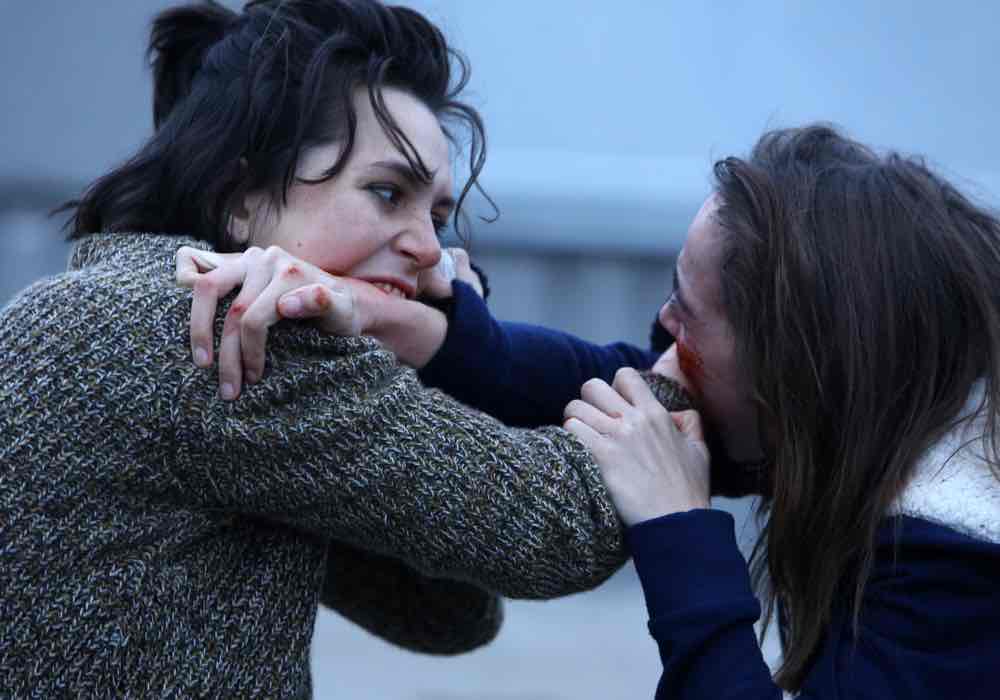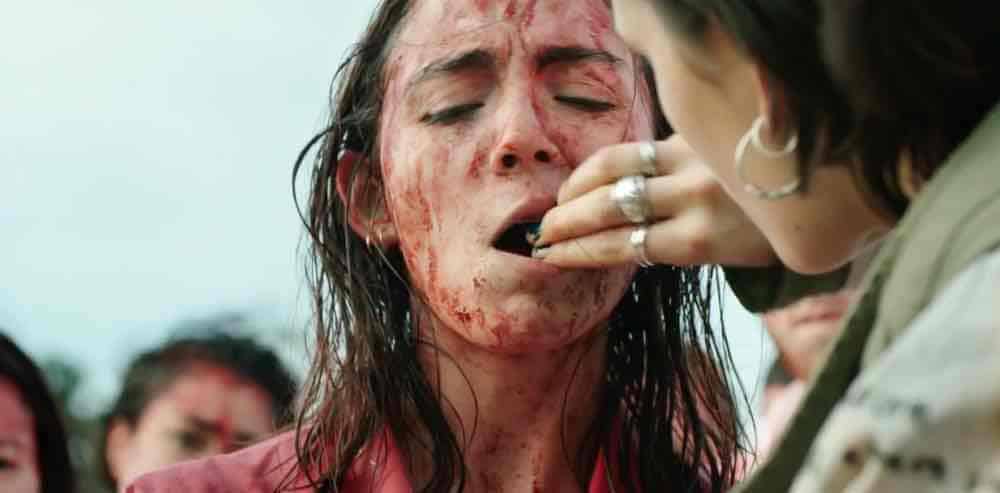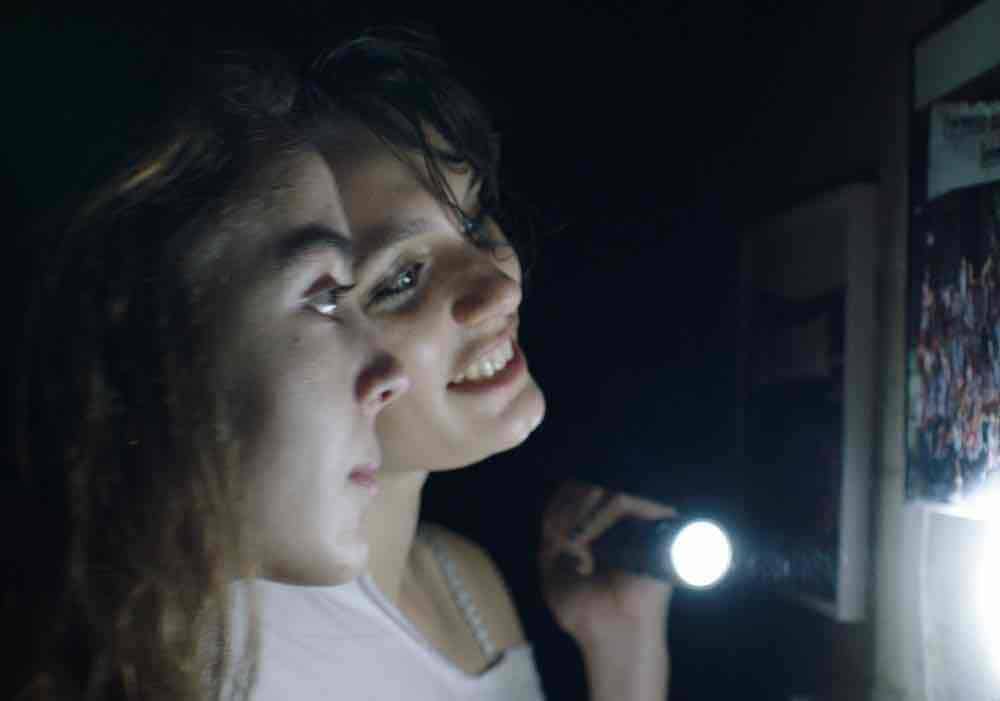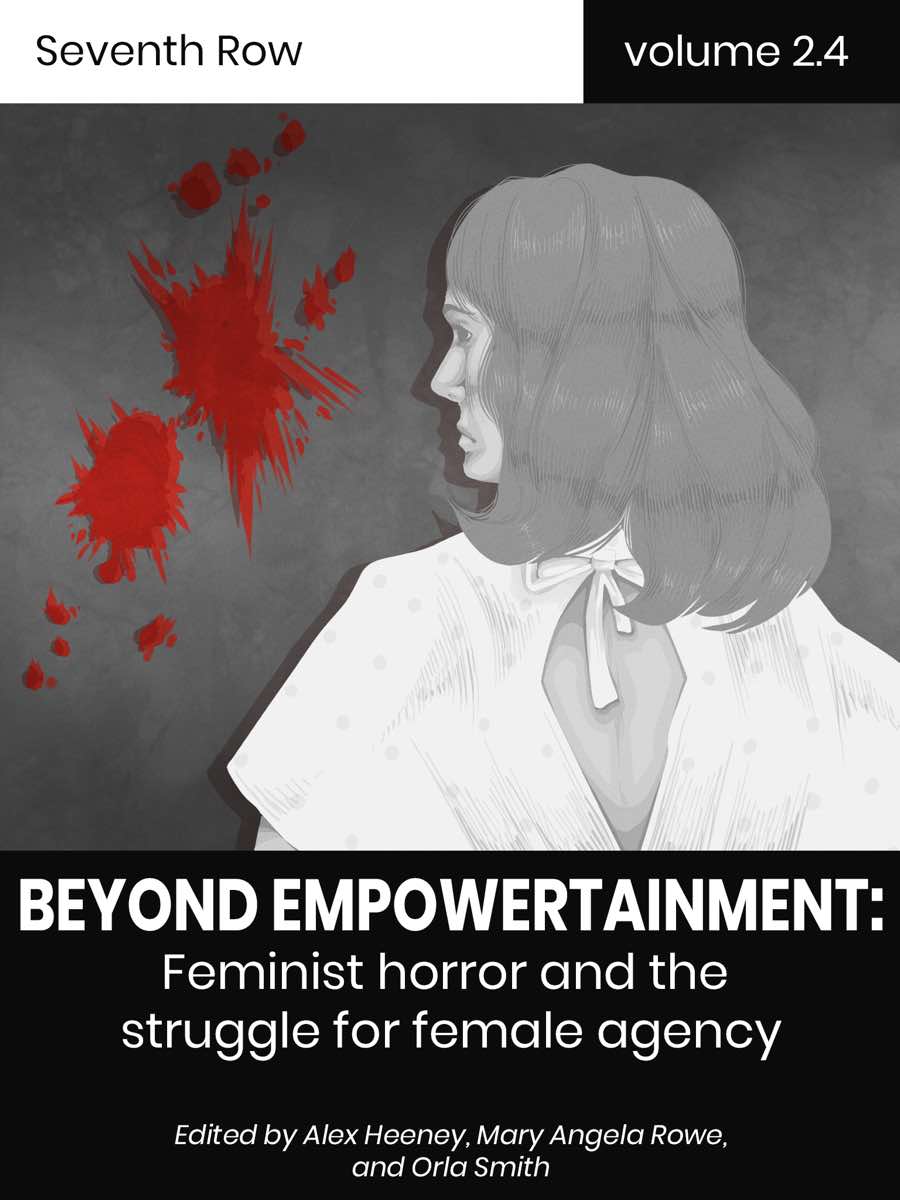In this essay, Orla Smith explores how Raw is as much about the experiences of her sister, Alex (Ella Rumpf), and their relationship — which saves Justine. This is a preview of our ebook Beyond Empowertainment.

Raw marks the emergence of a brilliant visual stylist in writer-director Julia Ducournau — and her aesthetic eye is matched by her humanism. Our protagonist is first-year veterinary student Justine (Garance Marillier). We track her journey from wide-eyed vegetarian to cannibal. Justine’s latent desire for flesh is thrust onto her all of a sudden when her older sister, Alex (Ella Rumpf), pressures her to eat a raw rabbit kidney during a veterinary college hazing ritual.
It’s unclear who the distant figure in the opening scene is, but we see a woman of Alex’s build instigating a car crash and predatorily approaching its victims. Alex later demonstrates this method of finding victims to her younger sister. The serenity of an empty highway is juxtaposed with the threat brought on by her prowling approach, set to the rising cacophony of Jim Williams’ score. Whether or not we know it at the time, Alex is our introduction to the film and its world, indicating her vital importance in all that will follow.
Justine and Alex share a proclivity for cannibalism, but they deal with it in very different ways. In the end, Alex cannot control her desires and murders Justine’s roommate, Adrien (Rabah Nait Oufella). She’s left in prison, whereas we leave Justine at home, safe. Long before Justine arrived, Alex cracked under the pressure of being alone and volatile. She had to give up her sanity and moral compass in order to dull her violent desires. Their beginnings were the same, but one thing separated them: Justine had Alex, and Alex had no-one.
Want to read the rest of the interview? Order a copy of our ebook on feminist horror beyond empowertainment here.
[wcm_restrict]
[clickToTweet tweet=”‘Their beginnings were the same, but one thing separated them: Justine had Alex, and Alex had no-one.'” quote=”‘Their beginnings were the same, but one thing separated them: Justine had Alex, and Alex had no-one.'”]
For the majority of the film, Ducournau confines us to Justine’s perspective: we follow her in almost every scene and often literally adopt her viewpoint when the camera constricts itself to the direction of her gaze. Through her eyes, it’s easy to dismiss Alex as a hardened, borderline antagonistic character who is the source of many of Justine’s problems. Yet Ducournau wants us to look closer, to see how both sisters are on different paths of the same course — and why.
[clickToTweet tweet=”‘Ducournau wants us to look closer, to see how both sisters are on different paths of the same course'” quote=”‘Ducournau wants us to look closer, to see how both sisters are on different paths of the same course'”]
Alex’s first year of veterinary college is a missing block of time in the film that our protagonist is blind to — and consequently, so are we. When Justine finds a tube of used up skin cream in Alex’s bathroom cabinet, she recognises it as the same cream that she had recently used to heal her own peeling flesh and mysterious rash that heralded the start of her transformation. This discovery of their shared cannibalism reassures Justine that she’s not alone and that it isn’t all in her head — a reassurance that Alex never had.
Once we know Alex’s backstory, on second viewing, her actions take on new meaning. When Justine struggles with the desire to recapture the experience of her first taste of meat, she resorts to chowing down on Alex’s recently severed finger. Ducournau isolates Alex in the frame as she wakes from unconsciousness and stares at Justine. This asks us to consider Alex’s perspective, but it’s only upon revisiting the scene — with the knowledge of what’s to come — that you notice how her eyes grow wide with something closer to shame than disgust. The tears that roll down her cheek are not simply tears of horror at her sister, but horror at herself.
[clickToTweet tweet=”‘The tears that roll down her cheek are not simply of horror at her sister, but horror at herself.'” quote=”The tears that roll down her cheek are not simply tears of horror at her sister, but horror at herself.”]

By making Alex the one who coerces Justine into eating the raw kidney, Ducournau forms an inextricable link between the two sisters. When Alex strides up to Justine at the hazing, they are framed separately. Ducournau makes sure to show us Alex’s reactions to the confrontation, and there’s a hint of nervousness in her voice, as if her confidence is rehearsed. Justine continues to protest. It’s not until Alex decides to force-feed her sister that the camera swerves around the two of them so that they fill the frame together. They are united by Alex’s grave decision and its consequences for Justine.
[clickToTweet tweet=”Alex coerces Justine into eating the raw kidney: Ducournau forms an inextricable link between them.” quote=”Alex coerces Justine into eating the raw kidney: Ducournau forms an inextricable link between them.”]
At first glance, Alex’s choice simply seems like her attempt to make Justine hew more closely to the social norms that she’s been so blissfully ignoring. Weathering cannibalism alone for the past year or two has made Alex angry and desperate to fit in when doing so seems impossible. Perhaps she wishes to spare Justine that same isolation, telling her: “Don’t start the year by chickening out. They’re watching”. Alex’s first thought is often of the thoughts of others: ‘Is my thong out of my shorts?’, she wonders, when the sisters reunite for the first time at a party and embrace. Later, she even makes Justine wax her bikini line and shave her armpits, despite her protestations.
Yet when Alex makes Justine eat the rabbit kidney, she does so with the full knowledge of where it will lead. Her eyes dart around the frame, and she stares at Justine’s mouth rather than her eyes. Her barbed exterior shows cracks. Rumpf reveals a desperation that is more akin to loneliness than malice: the unbearable thought of having to go through another year without the company of anyone who understands.
[clickToTweet tweet=”‘Rumpf reveals a desperation that is more akin to loneliness than malice.'” quote=”‘Rumpf reveals a desperation that is more akin to loneliness than malice.'”]
Justine can’t see the amount of trauma it took to drive Alex to this point because she did not witness it — just as Ducournau does not show it to us either, confining us to Justine’s self-centred perspective. Justine can’t feel for Alex, and so she’s repulsed when Alex shares how she copes with these uncontrollable desires.
In her own twisted way, that was Alex’s attempt to open up to her sister about the pain she has suffered in solitude. Alex cries, “I did this for you” when she realises that Justine is turning against her: this murder, one of many, was Alex’s way of being the guiding light for Justine that she herself never had. Those intentions are lost on Justine, who doesn’t think to look beyond her limited point of view. Ducournau’s camera rarely looks beyond it either, and so we’re made to share Justine’s distorted understanding of her sister.
[clickToTweet tweet=”‘Those intentions are lost on Justine, who doesn’t think to look beyond her limited point of view.'” quote=”‘Those intentions are lost on Justine, who doesn’t think to look beyond her limited point of view.'”]

Justine’s rejection sends Alex into her ultimate downward spiral. The point of no return comes when Alex decides to post a video online of a blackout-drunk Justine attacking dead bodies at the morgue. Before, Alex had always made herself available to Justine in a crisis, whether to lend her clothing or offer emotional support. It comes as a shock when Alex instead decides to punish Justine for what she sees as her selfish attitude. In the online video, Justine is wearing the dress she borrowed from Alex earlier in the film: Justine is content to take from her sister, but giving back is a different matter. As the older sister, Alex is expected to be the protector, but there is no-one to protect Alex.
While her mere presence in Justine’s life makes Justine’s cannibalism easier to bear, Alex is still far from a supportive sister. She is embittered and often blocks any chance of a deeper connection that might help her out of the pit she’s dug herself into. One possible moment of reconciliation — when they play video games together — is punctuated by Alex’s antagonistic impulses. Alex comments that Justine is looking thinner, but is quick to clarify that it’s not a compliment. Alex is trying to tell her sister that her hunger will only get worse — “I know what happens. You won’t hold up” — but she can only communicate through taunts.
[clickToTweet tweet=”‘Cannibalistic desire may be strong, but it’s possible to control — with enough emotional support.'” quote=”‘Cannibalistic desire may be strong, but it’s possible to control — with enough emotional support.'”]
Cannibalistic desire may be strong, but the conclusion that Ducournau draws is that it’s possible to control — with enough emotional support. Justine never resorts to murder like Alex does, even though she goes through hell in the film. Alex is the reason Justine is able to restrain herself. Eventually, it’s Alex that tries to sabotage Justine’s precarious stability.
[clickToTweet tweet=”‘What finally brings them back together, over the body of Alex’s victim, is empathy.'” quote=”‘What finally brings them back together, over the body of Alex’s victim, is empathy.'”]
What finally brings them back together at the end of the film, over the body of Alex’s victim, is empathy. The moment that Justine realises what Alex has done, her first instinct is to reach for a weapon. But looking down at her forlorn sister from that position of power, the resentment Justine may have held against Alex disintegrates. She helps Alex to clean herself off in the shower right after the murder, in a two-shot that finally places the sisters side by side, on equal footing. The blood that had caked both of their faces and bodies mixes interchangeably and flows down the drain. Finally, she understands why her sister is who she is, and she can no longer hold it against her.
[/wcm_restrict]


